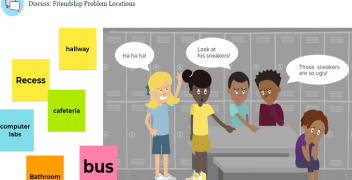Friend to Friend: Reducing Relational Aggression In School Settings
Friend to Friend (F2F) is a school-based intervention program designed to reduce aggression, with a focus on relational aggression, among high-risk children. Relational aggression is nonphysical behavior characterized by manipulating social relationships through gossip and social exclusion. Research has established that relational aggression in schools is associated with a host of adverse psychosocial outcomes for youth and also has a negative broader impact on classroom climate and student-teacher relationships. Historically, few programs focused on females and the aggression they are more likely to use (i.e., relational aggression), which is a gap F2F was uniquely designed to address. While F2F includes a focus on relational aggression, all forms and modalities of aggression are addressed (physical, verbal, cyber).
F2F was developed by researchers at Children's Hospital of Philadelphia (CHOP) in the early 2000’s. The original version of F2F included 20 small group sessions with accompanying classroom lessons conducted by CHOP facilitators. In 2017, F2F transitioned to a school-led program such that school counselors (small-group) and teachers (classroom component) run the program with training and coaching from CHOP. The coaching model builds the capacity for schools to implement and sustain this much needed prevention programming. Further, the feasibility of F2F has been enhanced by reducing small group sessions from 20 to 14.
The primary component of F2F is a small group pull-out intervention for relationally aggressive 3rd-5th grade children. The small-group intervention teaches children about different types of friendship problems (i.e., physical, verbal, social, and cyber), identify feelings, use calming strategies, interpret others’ intentions accurately (understanding of hostile attribution biases or the tendency to interpret others' behaviors as having hostile intent), and make careful choices for responding to aggression. If schools choose to include universal programming along with small groups, there are accompanying classroom lessons that extend the curriculum to all students in the classroom and offer leadership opportunities for small group participants to help teach strategies to their peers. In the first two clinical trials of F2F, the classroom lessons were a secondary component of F2F curriculum. However, schools can now utilize the curriculum from our universal PRAISE program.
Program Details
- How Friend to Friend Works
- For 3rd-5th graders
- 14 small-group sessions
- 30-45 minutes, one session per week
- Counselor-led, with training and coaching from CHOP
- Can be used in conjunction with classroom/universal programming such as PRAISE: Friendship Voyagers
- Evidence-base for Friend to Friend
Developmental and pilot studies of F2F were funded by the National Institute of Mental Health (NIMH) (see Leff et al., 2007; Leff. et al., 2009), after which an NIMH-funded randomized controlled trial of F2F was conducted with 144 girls identified as demonstrating relationally aggressive behaviors in six elementary schools and their classmates. Specifically, it was found that in comparison to a psychoeducational group intervention, girls in the F2F intervention demonstrated decreases in relational aggression and increases in knowledge of social problem-solving skills, with findings maintained one year after the conclusion of the program. Further, the F2F program was rated as extremely acceptable and engaging by participating students and teachers and was able to be implemented with high levels of procedural and process integrity (see Leff, Paskewich, Waasdorp, et al., 2015 below).
Using data from the same randomized control trial, CHOP researchers also examined the broader effects of F2F by determining the impact of the program on 665 classmates of the relationally aggressive girls. These classmates did not participate in the small-group sessions but were exposed to the program through the classroom lessons that F2F girls helped run. It was found that after the intervention, boys scored higher in peer ratings of positive friendships and being nice and scored lower in peer ratings of rumor-spreading, exclusion, and fighting compared to boys in the control classrooms. The boys also had more positive relationships with their teachers. Girls in the F2F classrooms who were not involved in the small-group sessions were rated by peers as being higher in positive friendships and being nice compared to girls in the control classrooms (see Leff, Waasdorp, & Paskewich, 2016).
Support from Kohl’s Cares® (2017-2019) allowed for the adaptation of F2F to a coaching implementation model, which yielded promising findings to inform a larger randomized control trial of the coaching version of F2F (see below).
- Current Research
The National Institutes of Child Health and Human Development/National Institutes of Health (2019-2026) is funding a large clinical trial to test the effectiveness of the coaching adaption of F2F. Mediators and moderators of program success (for whom and under what conditions the program works best) and factors associated with staff adoption and implementation of the program with more limited support from CHOP will also be examined.
Recommended Resources
- Publications on Friend to Friend
- Leff SS, Angelucci J, Goldstein AB, Cardaciotto L, Paskewich B, Grossman M. Using a Participatory Action Research Model to Create a School-based Intervention Program for Relationally Aggressive Girls: The Friend to Friend Program. In J. Zins, M. Elias & C. Maher (Eds.), Bullying, Victimization, and Peer Harassment: Handbook of Prevention and Intervention (pp. 199-218). 2007. New York, NY: Haworth Press.
- Leff SS, Gullan RL, Paskewich BS, Abdul-Kabir S, Jawad AF, Grossman M, et al. An Initial Evaluation of a Culturally-adapted Social Problem Solving and Relational Aggression Prevention Program for Urban African American Relationally Aggressive Girls. Journal of Prevention and Intervention in the Community. 2009;37(4):260-274.
- Leff SS, Paskewich BS, Waasdorp TE, Waanders C, Bevans KB, Jawad AF. Friend to Friend: A Randomized Trial for Urban African American Relationally Aggressive Girls. Psychology of Violence. 2015;5(4):433-443.
- Leff SS, Waasdorp TE, Paskewich, BS. The Broader Impact of Friend to Friend (F2F): Effects on Teacher-student Relationships, Prosocial Behaviors, and Relationally and Physically Aggressive Behaviors. Behavior Modification. 2016;40(4):589-610.
- Related Publications
- Waasdorp TE, Baker CN. Paskewich BS, Leff SS. The Association Between Forms of Aggression, Leadership, and Social Status Among Urban Youth. Journal of Youth and Adolescence, 2013. 42(2):263-274.
- Leff SS, Baker CN, Waasdorp TE, Vaughn NA, Bevans KB, Thomas NA, Guerra T, Hausman AJ, W Monopoli J. Social Cognitions, Distress, and Leadership Self-efficacy: Associations with Aggression for High-risk Minority Youth. Development and Psychopathology, 2014. 26(3):759-772.
- Waasdorp TE, Monopoli W, Horowitz-Johnson Z, Leff SS. Peer Sympathy for Bullied Youth: Individual and Classroom Considerations. School Psychology Review, 2019. 43(3):193-206.
- Friend to Friend Blog Posts
- Using a Community-Based Participatory Research Approach to Expand the Impact of a School-based Aggression Prevention Program -- October 20, 2022
- Unmasking Relational Aggression in Schools -- February 23, 2022
- Adapting Bullying Prevention Coaching for Virtual Delivery -- November 12, 2020
- Using Digital Innovation to Bring CHOP’s Friend to Friend Program Online -- October 15, 2020
- Peer Sympathy is Key to Reducing School Bullying -- February 25, 2020
- Decreasing Aggression in Schools: CHOP’s Friend to Friend Program Expands Across the Philadelphia School District -- August 6, 2019
- CHOP Psychologists Aim to Enhance Classroom Culture From the Inside Out -- August 2, 2019
- Decreasing “Mean Girl” Aggression Associated With Better Behavior Across Classroom -- June 13, 2016
- School-based Intervention Can Help Stop “Mean Girls” Tendencies -- November 23, 2015







